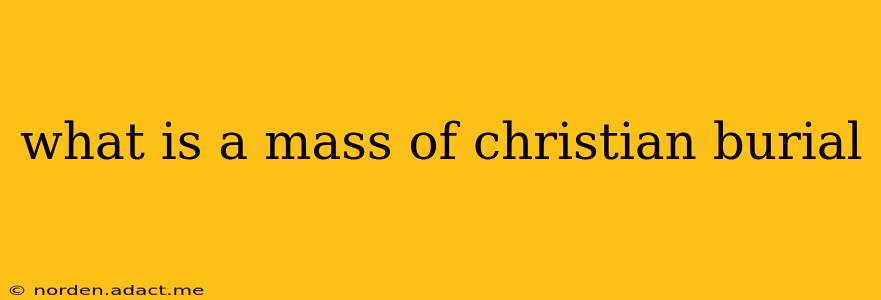A Mass of Christian Burial, also known as a Requiem Mass, is a liturgical celebration of the Eucharist offered for a deceased member of the Catholic faith. It's not simply a funeral service; it's a sacred act deeply rooted in Catholic theology, offering both consolation to the mourners and a prayerful entrustment of the deceased soul to God's mercy. Unlike secular funeral services, the Mass focuses on the resurrection and eternal life promised through Christ, offering hope and faith in the face of death.
What are the key elements of a Mass of Christian Burial?
The Mass of Christian Burial follows a specific structure, incorporating elements that reflect the Catholic belief in the afterlife and the importance of communal prayer. Key elements include:
-
The Entrance Procession: This begins with the casket (often carried by pallbearers) entering the church, symbolizing the entry of the deceased into the presence of God. Prayers are often recited during this procession.
-
Opening Rites: These include the opening hymn, the Penitential Rite (seeking forgiveness for the sins of both the living and the deceased), the Kyrie (Lord, have mercy), and the Gloria (if appropriate for the circumstance).
-
Liturgy of the Word: This section includes readings from Scripture, chosen to offer comfort and hope to the mourners and to reflect on the life, death, and resurrection of Jesus Christ. A homily (sermon) is usually given, often reflecting on the deceased's life and faith.
-
Presentation of the Gifts: Offerings of bread and wine, which will be consecrated during the Eucharist, are brought forward. These symbolize the sacrifice of Christ and the offering of the deceased's life to God.
-
Eucharistic Prayer: This is the central part of the Mass, where the bread and wine are transformed into the Body and Blood of Christ. The Eucharistic Prayer specifically remembers and intercedes for the deceased.
-
Communion: The consecrated bread and wine are distributed to the congregation, symbolizing communion with Christ and with one another in faith and prayer.
-
Concluding Rites: The final prayers and blessings are offered, along with a dismissal, signifying the end of the liturgical celebration.
What is the difference between a Mass of Christian Burial and a funeral service?
While both are occasions to mourn and commemorate a deceased person, the key difference lies in the theological focus. A funeral service can be secular or religious and often centers on remembering the life and accomplishments of the deceased. A Mass of Christian Burial, on the other hand, is specifically a Catholic liturgical act centered on the belief in the resurrection and the intercession for the soul of the departed. The Mass emphasizes the eternal life promised through Christ, offering hope and comfort to those who mourn.
Is a wake held before a Mass of Christian Burial?
A wake (also known as a visitation) is often held before a Mass of Christian Burial. The wake provides a time for family and friends to pay their respects to the deceased, offer condolences to the bereaved, and share memories. While not a liturgical part of the Mass itself, it serves as a significant part of the overall process of mourning and remembrance within the Catholic tradition.
What prayers are said at a Mass of Christian Burial?
Specific prayers vary, but common elements include prayers for the deceased, prayers for the grieving family, and prayers for God's mercy and forgiveness. The prayers often reflect themes of hope, resurrection, and eternal life. The specific readings and prayers are chosen by the priest or celebrant and are often reflective of the life and faith of the deceased.
Can non-Catholics attend a Mass of Christian Burial?
Yes, absolutely. While the Mass itself is a Catholic liturgical celebration, all are welcome to attend and participate in the prayers and expressions of sympathy. The Mass offers a time for community support and shared grief, regardless of one's religious affiliation. The focus on remembrance and the offering of comfort extends beyond the Catholic faith community.
